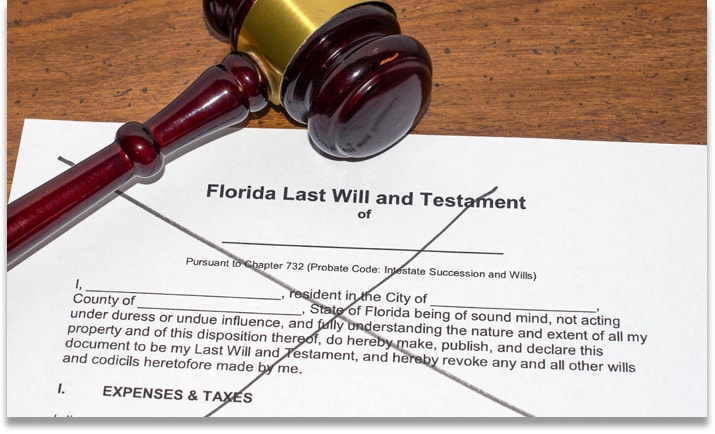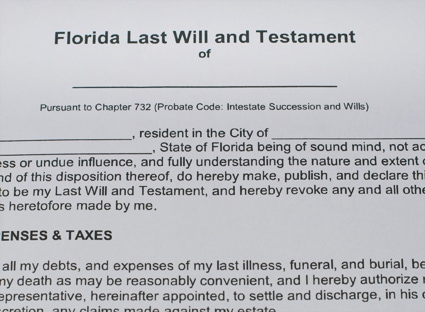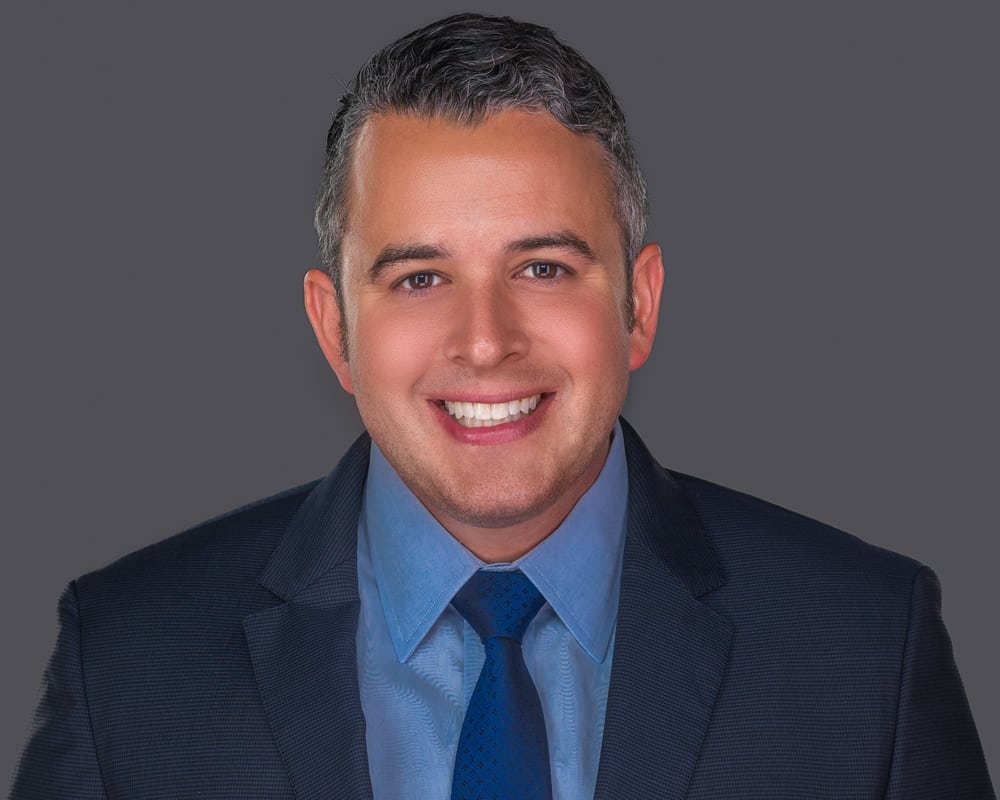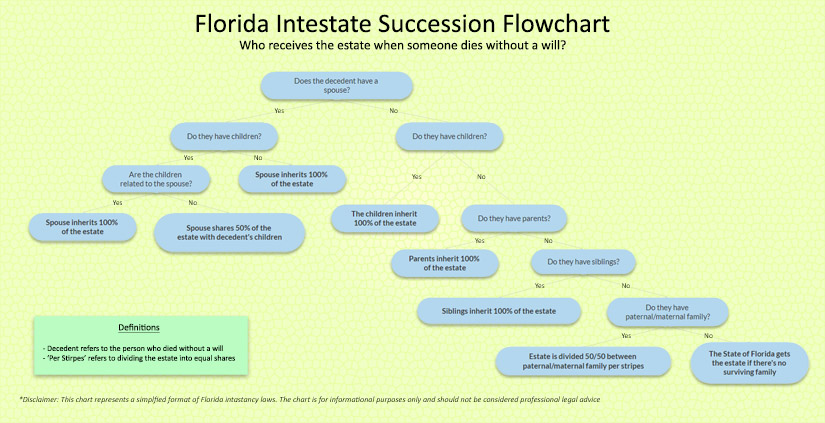Florida Will Contest Lawyers
Disputes over a will can be deeply personal and legally complex. Whether you believe a loved one’s wishes were manipulated or you’re defending against an unfair challenge, our Florida will contest attorneys are here to protect your rights.
Di Pietro Partners has decades of experience handling high-stakes probate litigation across the state, representing both beneficiaries and executors in cases involving undue influence, fraud, mental incapacity, and improper execution.

Our Probate Litigation Lawyers in the News
What is Contesting a Will?
Contesting a will means formally challenging its validity in probate court. In Florida, this usually involves a family member or other interested party claiming that the will doesn’t reflect the true intentions of the deceased often due to undue influence, fraud, or lack of mental capacity.
Because probate courts follow strict rules and deadlines, these cases require experienced legal guidance. Whether you’ve been unfairly excluded from a will or you’re defending against a claim, understanding your legal rights is the first step in resolving the dispute.
Legal Grounds to Contest a Will in Florida
In Florida, a will can’t be challenged simply because someone is unhappy with its terms. There must be legally valid grounds to contest the document and those grounds must be backed by evidence. Below are the most common legal reasons to dispute a will in probate court:
Undue Influence – This is the most common basis for contesting a will. Undue influence occurs when someone manipulates or pressures the testator (the person creating the will) into altering the document for their own benefit. This often involves a caregiver, family member, or person in a position of trust.
Lack of Testamentary Capacity – To create a valid will in Florida, the testator must have “testamentary capacity.” This means they understand the nature of their assets, who their natural heirs are, and the legal effect of the will. Wills signed under conditions like Alzheimer’s, dementia, or mental confusion may be invalidated.
Fraud or Misrepresentation – If a will was signed based on false information-such as a beneficiary lying to the testator to gain a larger share-the will may be contested for fraud. This also includes “fraud in the execution,” where the testator doesn’t fully understand they’re signing a will.
Improper Execution – Under Florida Statute § 732.502, a will must be signed by the testator at the end and witnessed by two people in the presence of the testator and each other. Any deviation from these formalities can result in the will being thrown out in court.
Duress or Coercion – A will signed under threat of harm or intimidation is not legally valid. These cases often arise when vulnerable individuals are pressured to change their estate plan out of fear or manipulation.
Insane Delusion – Florida law recognizes that a will may be invalid if the testator suffered from a fixed false belief without any basis in reality that affected how the will was written.
Why Choose Di Pietro Partners for Will Contests in Florida?
When a will is challenged, the legal and emotional stakes are high. At Di Pietro Partners, we have decades of experience handling contested wills and probate litigation throughout Florida. This includes representing both beneficiaries and personal representatives in disputes involving undue influence, capacity challenges, fraud, and improper execution.
Led by veteran trial lawyer David Di Pietro, our firm is known for courtroom strength, strategic insight, and a deep understanding of Florida probate law. Whether you’re fighting to protect your inheritance or defending a valid will from attack, we bring the experience and firepower needed to protect your interests.
- Decades of Probate Trial Experience
We’ve handled some of Florida’s most complex estate disputes, including multimillion-dollar will contests involving families, fiduciaries, and high-value assets. - Dual-Sided Representation
We represent both executors defending a will and beneficiaries challenging one-giving us insight into how both sides build (and break) their cases. - Tailored Legal Strategy
Every will contest is different. We build personalized strategies to resolve disputes efficiently-or litigate aggressively when necessary.
Meet Our Will Contest & Probate Litigation Attorneys
David Di Pietro
Founding Partner
A nationally recognized trial attorney and frequent legal analyst on Fox News, CNBC, and Court TV, David has tried over 70 jury trials and led numerous multimillion-dollar estate cases. He’s widely known for litigating high-stakes probate disputes, including contested wills, fiduciary misconduct, and complex inheritance battles. As former chairman of one of the largest public healthcare systems in the country, David offers clients unmatched insight into both institutional law and family estate matters.
Nicole 'Niki' Martell
Partner
With over 50 trials to her name, Niki is a seasoned litigator who handles probate, guardianship, and estate-related disputes. Her experience includes securing injunctions in elder abuse cases, challenging improper will modifications, and defending clients in emotionally charged family litigation. She combines courtroom strength with a deep understanding of Florida probate law and elder protection.
Rodolfo 'Rudy' Mayor
Partner
Rudy handles complex probate and will contest matters, often involving fraud, undue influence, or multi-party estate disputes. His background includes work at the U.S. Department of Justice and on high-level federal cases involving fiduciary misconduct and estate fraud. Rudy’s disciplined litigation approach makes him an asset in cases involving significant estates and family conflict.
Florida Probate Laws for Will Contests
Understanding Florida probate laws is essential when contesting a will. These laws govern how estates are administered, how wills are validated, and how disputes are resolved through the court system.
The Florida Probate Code defines the legal rights and responsibilities of beneficiaries, personal representatives, heirs, and other interested parties during the probate process. This code is primarily found in Chapters 731-735 of the Florida Statutes.
If you’re involved in a will contest or estate dispute, knowing how these laws apply to your case is crucial. For a deeper legal overview, read our Complete Guide to Florida Probate Laws.
Will Contests & Florida Probate Law Updates in 2025
Florida’s probate laws continue to evolve, and several key developments in 2025 may directly impact how wills are challenged in court. Whether you’re a beneficiary contesting a will or a personal representative defending one, staying informed is essential.
1. Heightened Focus on Testamentary Capacity
Florida courts in 2025 are placing increased emphasis on medical documentation, witness credibility, and cognitive evaluations when assessing whether a testator had legal capacity. If there’s evidence of dementia, illness, or confusion, challenges based on lack of capacity are being taken more seriously.
Why it matters: Cases involving Alzheimer’s, medication effects, or mental decline may now have stronger legal footing when properly documented.
2. Refined Standards for Undue Influence Claims
Recent rulings have clarified what qualifies as “active procurement” of a will such as isolating the testator, selecting the drafting attorney, or benefiting disproportionately. Courts are also more open to circumstantial evidence showing manipulation by caregivers or family members.
Why it matters: Beneficiaries who were unexpectedly cut out of a will may have clearer paths to challenge its validity under the updated legal interpretation.
3. Improper Execution Now More Easily Challenged
Probate judges are taking a closer look at how wills are signed and witnessed. Mistakes in execution such as using a notary instead of proper witnesses may result in the entire will being invalidated.
Why it matters: More estates are facing will contests simply because formalities weren’t followed to the letter.
4. Increased Awareness of Estate Fraud & Forgery
With digital document access and rising elder exploitation, courts are seeing more fraud-based challenges. This includes forged signatures, fabricated amendments, and beneficiaries misleading the testator.
Why it matters: Even subtle acts of fraud can now lead to a successful will contest if supported by emails, drafts, or testimony.
Common Questions About Contesting Wills
Q. How long do you have to contest a will?
This depends on the circumstances of your case. Generally speaking, a will can be contested at any time before the probate process is finished. Probate involves submitting a will to the local county court where the individual resides at the time of death. Once a will is filed, it’s required that creditors, beneficiaries, etc. are provided notice. Once notice is provided, you have 90 days to challenge the will before the probate process is complete.After this 90 day window is closed, you generally cannot challenge a will; however, there are exceptions to this rule. For instance, if someone was prevented from contesting the will due to fraudulent activity (i.e. failure to provide notice of the decedent’s passing) then you can file a claim even after the will is probated.In short, you generally have 90 days to legally dispute the will during probate; however, this time period can be extended for cases involving unlawful activity.
Q. Who can challenge a will?
Beneficiaries named within the will, who were removed from the will, or any other “interested party” in the estate can challenge the will provided they have valid legal grounds to do so.
Q. What if someone dies without a will?
When someone dies without a valid will, assets/property are considered “intestate” and the probate process becomes more lengthy and complex. If someone dies intestate, the State of Florida will try and determine who receives assets based on relation to the deceased individual. In other words, these assets will generally go to a spouse, or family member. We wrote an article on intestate succession that covers this topic in greater detail.
Q. Do you need a lawyer?
Whether you’re a personal representative, executor, beneficiary, or other interested party, you absolutely require a legal professional when it comes to legal disputes involving wills. In these cases, you should obtain council from an experienced estate litigation lawyer who specializes in will contests within your state.
Q. Do you represent beneficiaries?
Yes, the estate lawyers at Di Pietro Partners are highly experienced in representing beneficiaries with valid legal disputes involving Florida wills. This includes cases involving misconduct by the personal representative, estate fraud, improper execution, undue influence, removal from an estate, and more.
Q. Do you defend executors and personal representatives?
Yes, our attorneys have decades of trial experience in probate litigation cases involving will and trust contests. This includes defending executors, personal representatives, and others against lawsuits from beneficiaries or other parties involved in estate disputes.
When Someone Passes Away Without a Will
In cases where a family member passes away without a valid will, their property will be declared “intestate” and the courts will have to use a specific process to determine which family member receives assets of the deceased. To simplify this process for readers, we’ve prepared a flowchart on Florida intestate-succession.
As discussed, this is a summarized version of the Florida probate law specific to intestate succession and wills. The full laws are more in-depth and have various exceptions depending on several circumstances. To put this in perspective, here’s an excerpt from Section 732.108 of the Florida Statutes regarding adopted children/children born out of wedlock.
“For the purpose of intestate succession by or from an adopted person, the adopted person is a descendant of the adopting parent and is one of the natural kindred of all members of the adopting parent’s family, and is not a descendant of his or her natural parents, nor is he or she one of the kindred of any member of the natural parent’s family or any prior adoptive parent’s family, except that:
(a)Adoption of a child by the spouse of a natural parent has no effect on the relationship between the child and the natural parent or the natural parent’s family.
(b)Adoption of a child by a natural parent’s spouse who married the natural parent after the death of the other natural parent has no effect on the relationship between the child and the family of the deceased natural parent.
(c)Adoption of a child by a close relative, as defined in s. 63.172(2), has no effect on the relationship between the child and the families of the deceased natural parents…” (The Florida Legislature, 2018, Adopted persons and persons born out of wedlock.)
As you can see, this process is very in-depth and often causes confusion and disagreements among beneficiaries which may ultimately lead to contested intestate probate. As a result, it’s vital to work with a Florida probate attorney that’s experienced with intestate succession.
Common Types of Wills in Florida
Wills are an essential part of any estate plan and are applicable to anyone regardless of the size of their estate. Wills serve many purposes; for instance, they help provide care for loved ones after someone’s passing, detail funeral arrangements, and detail how assets are distributed post-mortem. The State of Florida has a specific process for the drafting, witnessing, and execution of a will. If this process is not properly followed, then the will has a better chance of being successfully challenged in probate court.
There are many different variations of wills; however, only certain wills are legally recognized in a given State. Below are some of the most commonly used wills in the State of Florida.

- Simple Will
As the name may suggest, this will is the most common, and the most “straightforward” compared to others. Basically, a simple will is a legal document that details wishes of the person writing the will (the testator). This includes: the distribution of assets after death, care for family members, and more. This is commonly known as the “last will and testament.” - Pour-Over Will
Simply put, this is very similar to a “simple will;” however, one difference is that the pour-over will dictates what property/assets should be placed in a trust after your passing. - Complex Will
As the name indicates, a complex will is more in-depth. This will is commonly used for estates that are large and/or have specific conditions such as: estate taxes, special needs trusts, etc. - Testamentary Will
The testamentary will actually involves setting up a trust within a will. In fact, the real name of this document is “testamentary trust,” and is commonly referred to as “will trust” or “trust under will.” This provides more flexibility for an estate planning strategy in several ways including the potential in reducing/avoiding estate taxes.
Will Contests Involving Undue Influence
Undue influence is one of the most common reasons wills are contested in Florida. It often occurs when a vulnerable individual is pressured into changing their will to favor one person, usually to the detriment of other rightful heirs. The influencer may be a caregiver, relative, or new romantic partner who isolates the testator and exerts control during a period of weakness or illness.
Florida courts look for suspicious circumstances, such as the influencer being present during the drafting, benefiting disproportionately from the will, or having a confidential relationship with the deceased. If proven, the will-or specific provisions-can be invalidated.
Will Contests Involving Lack of Capacity
To create a valid will in Florida, the person signing must have “testamentary capacity,” meaning they understand the nature of their estate and the effect of their decisions. If the testator suffered from Alzheimer’s, dementia, or other cognitive impairments, the will may be subject to challenge.
Courts may consider medical records, witness testimony, and the timing of the will’s execution. A successful challenge can void the will entirely or reinstate a previous version.
Improper Execution of the Will
Florida law requires that wills meet strict formal requirements: the will must be in writing, signed by the testator, and witnessed by two individuals. Failure to follow these procedures-such as missing witnesses, backdated signatures, or improper notarization-can render the will invalid.
Improper execution is often easier to prove than subjective claims like undue influence. If the will fails to meet Florida’s statutory requirements under Fla. Stat. §732.502, it may be struck down in probate court.
Will Contests Based on Insane Delusion
An insane delusion is a specific form of mental incapacity that can invalidate a will under Florida law. Unlike general cognitive decline, an insane delusion is defined by the Florida Supreme Court as a “fixed false belief without foundation in reality.” Even if the testator appears mentally competent in other areas, a delusion that directly influences their estate planning decisions may render the will legally void.
These cases often arise when a testator disinherits a close family member based on a false belief, such as thinking the person stole from them or is conspiring against them, without any factual basis. If the delusion materially affects the distribution of the estate, it may serve as grounds to challenge the validity of the will.
Florida courts evaluate these claims carefully, often relying on medical records, expert testimony, and witness accounts to determine whether the delusion influenced the testator’s decisions. If proven, the court may invalidate the affected portions of the will or the entire document.
Will Contests Involving Duress
Duress occurs when a person is forced to execute or modify a will under threats, coercion, or intimidation. This often involves the threat of physical harm or severe emotional distress. Unlike undue influence, which involves subtle manipulation, duress involves overt pressure that overcomes the testator’s free will.
If it can be shown that the testator only signed or changed their will due to fear for their safety or that of a loved one, the will is not considered legally valid under Florida law. Probate courts take these claims seriously, but strong evidence is required. This often requires witness testimony, written communications, or behavioral patterns consistent with fear or coercion.
If duress is proven, the court may set aside the entire will or only the portions that were affected, and potentially reinstate a prior version of the will or distribute the estate according to Florida intestacy laws.
Will Contests Involving Fraud
Fraud is a serious legal ground for contesting a will in Florida. A will may be declared invalid if it was created or modified based on lies, deception, or intentional misrepresentation. In these cases, the testator’s intent is compromised because their decisions were made under false pretenses.
There are two main types of fraud recognized in Florida probate litigation:
- Fraud in the Execution – Occurs when the testator is misled about the nature of the document they are signing. For example, the testator may be told they are signing a power of attorney or routine paperwork when in fact it is a will.
- Fraud in the Inducement – Happens when someone deliberately provides false information to the testator, causing them to alter their will. This could include lying about a family member’s behavior or financial situation to influence inheritance decisions.
Other misrepresentations such as concealing facts or manipulating the testator’s understanding of the consequences may also qualify as fraud. If proven in court, the affected provisions or the entire will may be voided, and the estate could be distributed based on a previous will or Florida intestacy laws.
Will Contests Involving Forgery
Forgery is one of the most direct and serious grounds for challenging a will in Florida. If any part of the will is proven to contain a forged signature or was fraudulently altered without the testator’s knowledge or consent, the document is legally invalid.
Forgery can involve:
- A completely falsified will created without the testator’s involvement
- A legitimate will that is later altered without proper authorization
- A signature on the will that was forged by someone else
Challenging a will based on forgery typically involves handwriting experts, witness testimony, and forensic evidence. If the court finds clear and convincing proof that the will was forged, the entire document may be set aside, and the estate distributed under a prior valid will or Florida’s intestate succession laws.
Speak With a Will Contest Attorney
At Di Pietro Partners, we bring decades of probate litigation experience to cases involving contested wills. Whether you’re challenging a will based on undue influence or fraud, or defending a loved one’s final wishes, our attorneys have the skill and courtroom experience to protect your rights.
Our main office is in Fort Lauderdale, and we represent clients across Florida. If your will dispute falls under Florida probate law, we’re ready to help.
Contact us today for a confidential consultation with an experienced Florida will contest lawyer.



